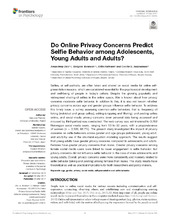| dc.contributor.author | Dhir, Amandeep | |
| dc.contributor.author | Torsheim, Torbjørn | |
| dc.contributor.author | Pallesen, Ståle | |
| dc.contributor.author | Andreassen, Cecilie Schou | |
| dc.date.accessioned | 2018-09-05T10:04:31Z | |
| dc.date.available | 2018-09-05T10:04:31Z | |
| dc.date.issued | 2017-05-23 | |
| dc.Published | Dhir A, Torsheim T, Pallesen S, Andreassen CS. Do online privacy concerns predict selfie behavior among adolescents, young adults and adults?. Frontiers in Psychology. 2017;8:815 | eng |
| dc.identifier.issn | 1664-1078 | |
| dc.identifier.uri | https://hdl.handle.net/1956/18392 | |
| dc.description.abstract | Selfies, or self-portraits, are often taken and shared on social media for online self-presentation reasons, which are considered essential for the psychosocial development and well-being of people in today’s culture. Despite the growing popularity and widespread sharing of selfies in the online space, little is known about how privacy concerns moderate selfie behavior. In addition to this, it is also not known whether privacy concerns across age and gender groups influence selfie behavior. To address this timely issue, a survey assessing common selfie behaviors, that is, frequency of taking (individual and group selfies), editing (cropping and filtering), and posting selfies online, and social media privacy concerns (over personal data being accessed and misused by third parties) was conducted. The web-survey was administered to 3,763 Norwegian social media users, ranging from 13 to 50 years, with a preponderance of women (n = 2,509, 66.7%). The present study investigated the impact of privacy concerns on selfie behaviors across gender and age groups (adolescent, young adult, and adult) by use of the structural equation modeling approach. The results suggest that young adults have greater privacy concerns compared to adolescents and adults. Females have greater privacy concerns than males. Greater privacy concerns among female social media users were linked to lower engagement in selfie behavior, but privacy concerns did not influence selfie behavior in the case of male adolescents and young adults. Overall, privacy concerns were more consistently and inversely related to selfie behavior (taking and posting) among females than males. The study results have theoretical as well as practical implications for both researchers and policy makers. | en_US |
| dc.language.iso | eng | eng |
| dc.publisher | Frontiers | eng |
| dc.rights | Attribution CC BY | eng |
| dc.rights.uri | http://creativecommons.org/licenses/by/4.0 | eng |
| dc.subject | age | eng |
| dc.subject | gender | eng |
| dc.subject | privacy | eng |
| dc.subject | social media | eng |
| dc.subject | self-presentation and selfie behavior | eng |
| dc.title | Do online privacy concerns predict selfie behavior among adolescents, young adults and adults? | eng |
| dc.type | Peer reviewed | |
| dc.type | Journal article | |
| dc.date.updated | 2018-03-06T09:28:00Z | |
| dc.description.version | publishedVersion | |
| dc.rights.holder | Copyright 2017 The Author(s) | eng |
| dc.identifier.doi | https://doi.org/10.3389/fpsyg.2017.00815 | |
| dc.identifier.cristin | 1468922 | |
| dc.source.journal | Frontiers in Psychology | |

